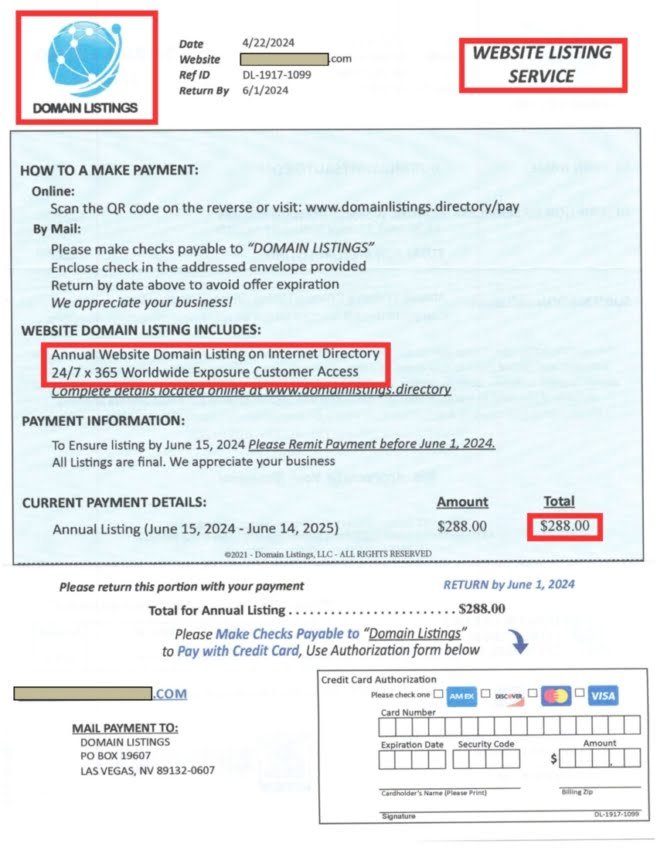Domain Listing Scams: How To Avoid Them
Domain listing scams
If you have ever received a letter or an email, like the one below, that appears to be a bill for your domain name registration or renewal, then you may have come across what is known as a domain listing scam.
While it may look like a legitimate invoice for a domain name renewal, upon closer inspection you will notice that the letter is not from your actual domain registrar, but instead it’s a solicitation letter from a company you’ve never heard of, designed to deceive and trick unsuspecting you into paying unnecessary fees for a domain listing.
What is a domain listing, anyway?
Excellent question! It is a list of domain names. That’s it. You are paying to be on a list. The list is not promoted, it does not generate traffic, improve SEO, or provide any real benefit to you, the domain name owner.
You could get the same benefits — and save $288 — by writing your domain name on a sheet of paper, folding it in half, and sticking it in a drawer.
Why the scam works
Without getting into the psychology of why scams work, this one takes advantage of a few things.
First, the fear of losing your domain name. At first glance, this letter appears to suggest that your registration is about to expire. As a business owner the thought of losing your domain name can send a shiver down your spine.
Second, your knowledge of domain registrar terminology. “Domain listing” sounds important. It sounds like industry jargon. Why would you doubt this was legitimate?
Third, your lack of time. They count on you being too busy to spend much time critically evaluating what appears to be a fairly affordable, domain related invoice.
Is it really a scam?
I guess that depends on your definition of a scam. It is a letter or email that looks like a bill for a domain renewal. It looks so much like one that they have to include text, very small text, stating it is NOT an invoice.
So, is an intentionally deceptive solicitation letter a scam? I say yes.
How to identify the scam
A little vigilance is all it takes to protect yourself from falling victim to domain listing scams.
In the example below I have highlighted some of the things to look for when reviewing a domain listing scam email or letter, such as the company name, the vague “services” section, and the fees.
You may also want to look for the phrase, in very small print, “this is not an invoice” or “this is a solicitation”. Both are clear signs of a scam.
Additional tips to help you avoid becoming a target
1. Verify the Sender
Always verify the sender of any domain-related communication. Check the email address, the company name, and the contact information provided. If it does not match your domain registrar’s details, it is likely a scam.
2. Review Your Domain Registration
Regularly review your domain registration details to ensure that all the services you are being billed for are legitimate and necessary. If you receive a bill for a service you do not recall requesting, it is a red flag.
3. Contact Your Domain Registrar
If you are unsure about the legitimacy of a bill or communication, contact your domain registrar directly. They will be able to confirm whether the communication is legitimate or a scam. Do not use the contact information provided in the suspicious letter or email; instead, use the contact details listed on your domain registrar’s official website.
4. Educate Yourself and Your Team
Domain listing scams can target individuals and businesses alike. Educate yourself and your team about these scams to prevent anyone from falling victim to them. Train your employees to recognize the signs of a scam and how to respond appropriately.
5. Report the Scam
If you receive a domain listing scam letter or email, report it to the appropriate authorities. This can help prevent others from becoming victims of the same scam. You can report scams to your local consumer protection agency or to organizations such as the Federal Trade Commission (FTC).
In summary
Domain listing scams can be deceptive and convincing, but with the right knowledge and precautions, you can protect yourself from becoming a victim. Remember to verify the sender, review your domain registration details, contact your domain registrar for confirmation, educate yourself and your team about scams, and report any suspicious activity. By staying informed and alert, you can avoid falling prey to these fraudulent practices.
Need help managing your domain name? Contact me to schedule an appointment.

